© 2026 ALLCITY Network Inc.
All rights reserved.

Every player has a routine when they finish up a practice and get into the locker room. For Ryan Graves, he takes his helmet off and immediately puts on an Avalanche baseball cap, usually backward.
He looks at me and flashes the smile that’s made him so popular on Avalanche social media. We sit and talk about a little hockey and some life. Life is good these days for Ryan Graves.
It wasn’t always that way.
A fourth round selection of the New York Rangers back in 2013, Graves was one of the top defensive prospects for the Rangers when he turned pro in 2015. Things didn’t go as planned and despite the Rangers transitioning from gunning for the Stanley Cup to retooling, Graves never got a chance in the NHL.
In a last-minute trade deadline deal in 2018, he was dealt to Colorado in exchange for Chris Bigras.
“It was a weird situation there,” Graves said. “Their backend was NHL defensemen that were going to play there so there was no real room there, no space. My first year there Brady Skjei and I were the two young guys coming in and we both had good years but he was a first-round pick. He’s an excellent player and you see it now so that was expected that he would make the jump quicker than I was. It’s not like they had any room regardless of how I played. They had a really good back end. There wasn’t a huge amount of disappointment because I expected to be where I was. You hope to get a chance during your entry-level [contract], so that was disappointing for me for sure. The year I got traded here, they had a lot of injuries and call-ups and I wasn’t one of them so that was kind of a blessing to get a fresh start at that point.”
Graves is a guy who views the world through a positive lens but after three years of grinding through the development process for the Rangers’ AHL team in Hartford, even Graves allowed doubts to creep in.
“There’s been doubts, yeah,” he said. “There are times when you’re wondering. I was fortunate for the Rangers to let me go and get a fresh start somewhere else. I hold no ill will towards them but thankful for my opportunity here. It’s been fun and it’s just a start for me.”
The fresh start with the Avalanche was just what the doctor ordered. Life in Hartford had taken a familiar feel and the change to San Antonio opened Graves up to something that had started slip – fun.
“When I got traded, it wasn’t like I was going straight to the NHL,” Graves admitted. “I knew that. I was happy for a fresh start. San Antonio was a new team, nice weather, and I started to enjoy it again. In Hartford, you have a couple of bad days at the rink and there’s not much to get away from the game. I lived in an apartment very close to the rink and it was cold. You’re not going out and doing very much. San Antonio is nice and you can go sit by the pool or play nine holes. I gained a sense of fun again for hockey.”
While Graves didn’t see any NHL action with the Avalanche the year he was traded for, Colorado saw enough to extend him a qualifying offer and bring him back. There were still no expectations on him as Colorado’s AHL affiliation transitioned from San Antonio to Loveland with the Eagles.
“Last year, coming in, [Loveland] is a great spot,” Graves said. “I liked it, my girlfriend liked it. I liked the staff. [Head coach Greg Cronin] really understands the game and he’s great. He’s a great coach for there. He cares about the people, cares about everyone as an individual and wants everyone to succeed. He’s pretty direct and can be pretty harsh at times but if you can handle it, he has your best interest. He taught me a lot and he’s a huge reason I was able to develop and make the jump.”
That jump happened in December of 2018. The call-up was a boon for Graves and his confidence. He had seen multiple defenders called up before him but each eventually returned. To finally get that call, it was now or never for Graves.
“You know what’s happening,” Graves said of watching players get called up over him. “You want to be sitting at the top of the [call-up] order. You have to control what you can control. If you’re so worried about what everyone else is doing, you’re probably not going to play your best hockey. You can’t control who is getting called up; you just try to force their hand, in a sense. That was my mentality last year. Control what you can control and play your best hockey and hopefully you get a chance.”
Graves got his chance. He made his NHL debut in a 2-1 loss to the Vegas Golden Knights, playing just 8:26. The Avs were mired in a deep slump at the time but Graves slowly emerged as a positive during a very negative time for the team.
“When I got called up, we were in that slump last year,” Graves recalled. “My first 10 games, we might have won two of them. That was tough. You take what you can get, try to play your best game. I was lucky to be thrown into situations where I can help the team and prove I can play.”
It was uneven for Graves overall but he made a strong enough impression the Avalanche felt uncomfortable putting him through the waiver wire to send him back to the Eagles.
Graves finished the year in Denver, much to the dismay of at least one competitor.
“We saw it right away,” said one scout from a Western Conference team. “We liked him a lot. When [Colorado] kept him on the roster, we were disappointed. We liked the idea of claiming him if he was put through waivers.”
That opportunity for that club never came as Graves seized the moment when he was called up. His combination of attitude and play is what made him so appealing to this club.
“His toughness and IQ stood out for us,” that same scout said. “His maturity in coming up from the AHL, finally getting his shot and being unafraid of the moment, that’s a guy you want when you get into the playoffs. A lot of kids play with fear when they show up and he didn’t. He stayed true to himself and that stood out a lot.”
It stood out to the Avs, too, as they kept him on the roster for the rest of the season. Despite being a healthy scratch for every game during the team’s playoff run, Graves learned a lot being in that atmosphere and getting a feel for what the NHL postseason is like.
“Everyone got healthy again and I was sitting in the playoffs,” Graves said. “But again, there’s an order of things and you understand that and you need to be ready. It was cool to be around. You get a sense of the playoff atmosphere and you see what guys are doing and see how intense the games are.”
Graves finishes the year with 26 appearances and watched the team acquire more depth over the summer in the form of Kevin Connauton and Calle Rosen in separate trades. Add that to the full-time addition of Cale Makar and suddenly Graves was facing a number crunch coming into training camp.
“This year coming in, my goal was to make the team out of camp,” Graves said. “There was a lot of D in this organization. We’re deep. My mentality was I had to come and earn a spot and I knew that. I came in and played my game and just tried to find a role.”
Graves did exactly that. He won a job and outlasted all contenders. He has rewarded the Avalanche with nothing short of a major surprise this season. His defensive play has been sound, as you can see below.
But the offense has also been there for Graves, who has 19 points (eight goals, 11 assists) in 48 games played. That two-way play has raised eyebrows around the league.
“I didn’t really see it last year,” said a scout from another Western Conference team. “This year, I’ve been much more impressed with his ability to step up offensively. He’s gained a lot of confidence with the physical side of the game and you can see the difference it makes. He steps into guys now and it gets him going. It energizes him and he picks his game up when he does that.”
That play has also impressed Avalanche head coach Jared Bednar and assistant coach Nolan Pratt, who is in charge of the defense. Bednar has mentioned on multiple occasions the growth in trust the staff has experienced with Graves this year.
“Solid defending details. He’s getting better and better at moving the puck out of our zone. He’s finding spots to jump in and be part of our offense. Whether that’s blasting pucks from the blue line or jumping up as the third or fourth guy on the rush, he’s been contributing all over the place. He’s a much-improved player from when we got him last year. Hopefully, he can continue to grow. He’s a big part of our team.”
That trust primarily shows in usage, where Graves is fifth among Colorado’s regular defenders in ice time at 18:10. Those numbers, however, have seen as a big leap as Graves has averaged over 20 minutes per game in both December and January.
Where he separates is shorthanded, where he is second behind only Erik Johnson with 2:43 SHTOI per game. While the penalty kill is still a work in progress, it’s a chance for Graves to continue proving he belongs.
“Especially for a player my style, it’s good,” Graves said of earning that trust. “I’m not concerned about points or however many minutes I’m going to play on the power play or whatever. That’s not my responsibility. There are guys that are better than that than me and that’s why they’re here. For me, it’s about being able to be reliable and be able to find a role on the PK and help that out and play a shutdown role. It’s nice to hear I have trust because it takes time to build it.”
Graves makes for a great story and the eyes are saying he’s a guy making a case to stay. But there’s more to what the eyes tell you about a player. Let’s take a look at some of his fancy stats here.
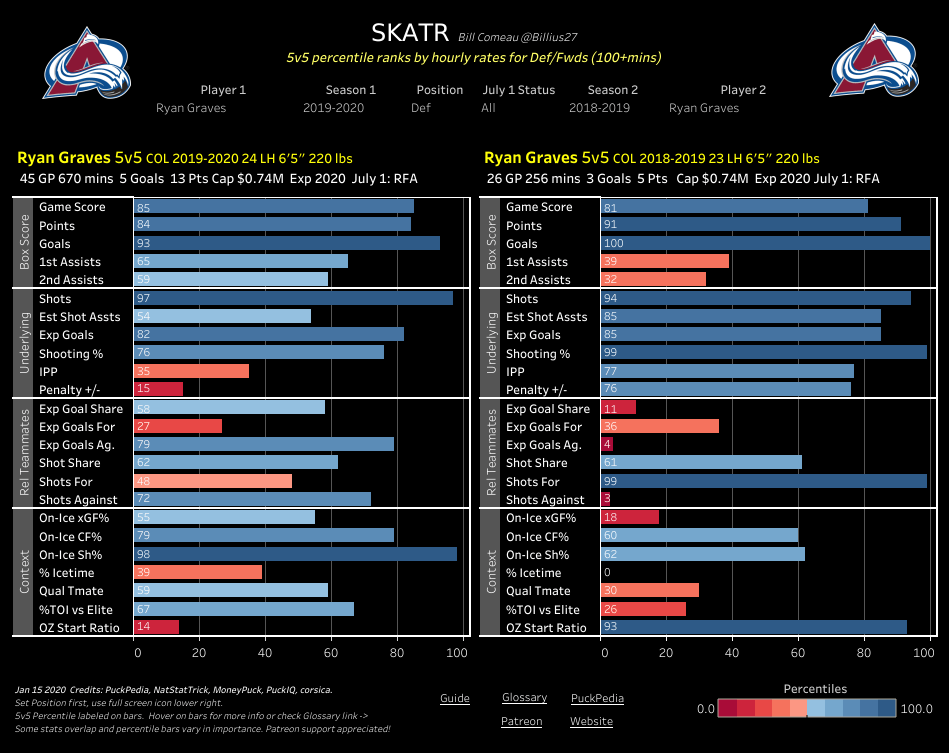
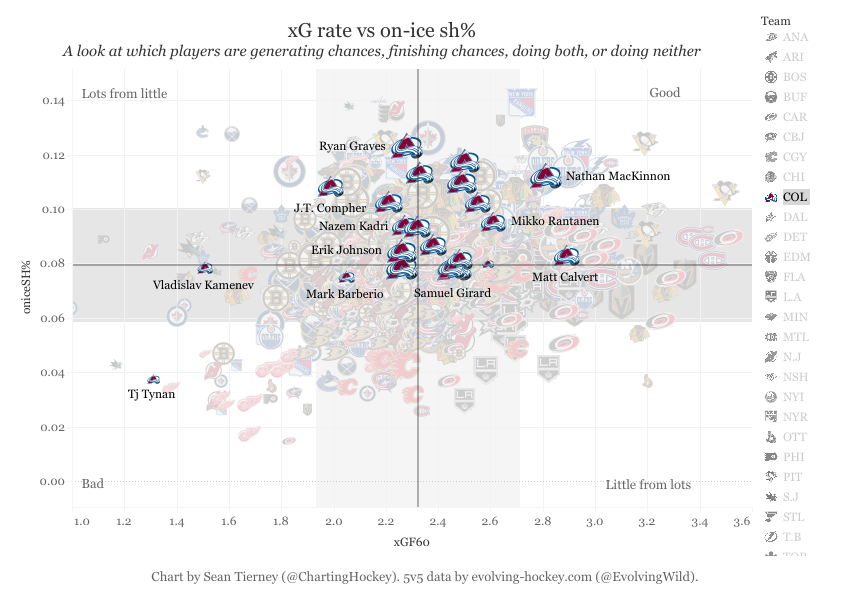
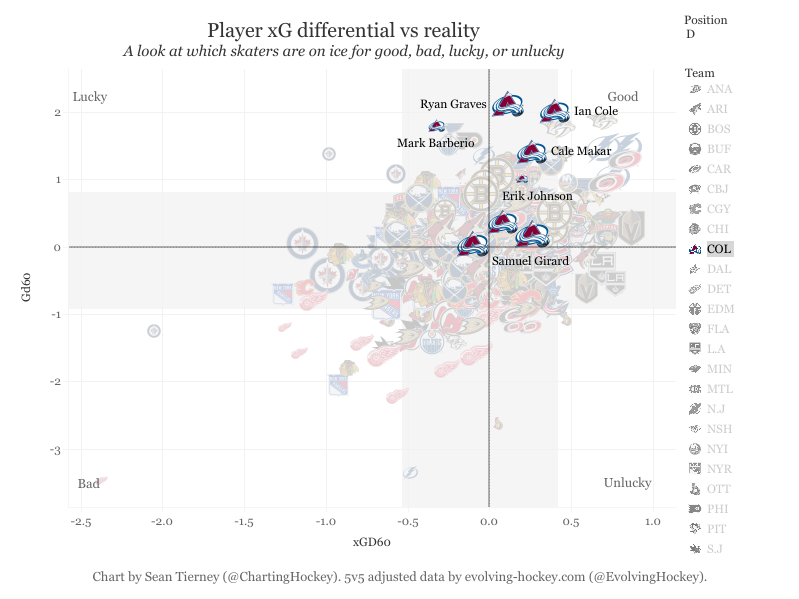
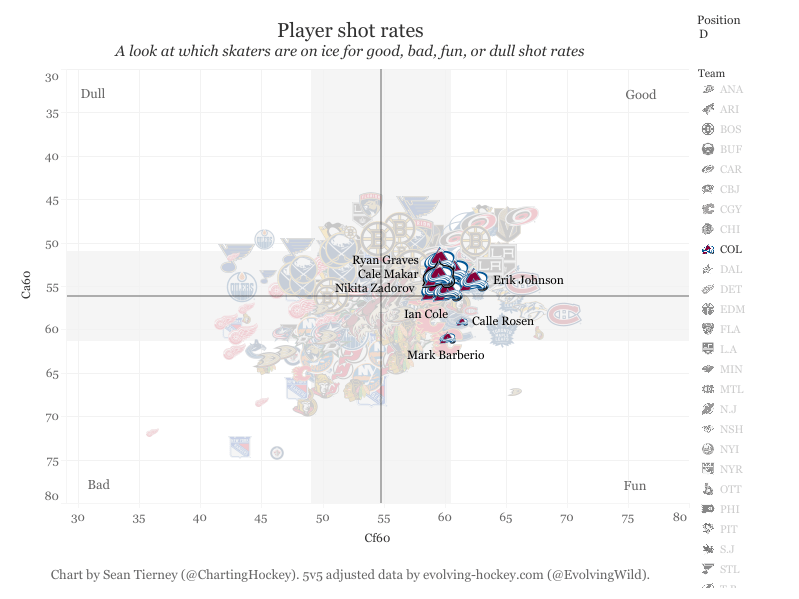
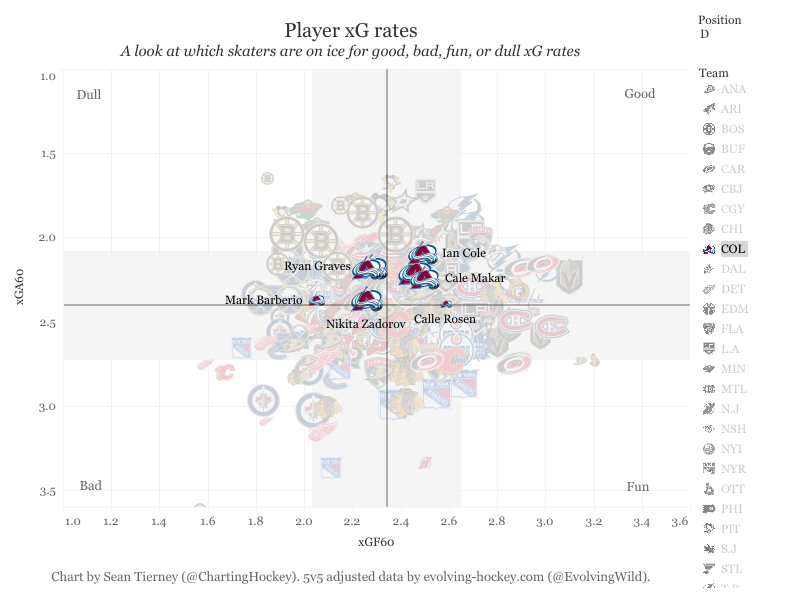
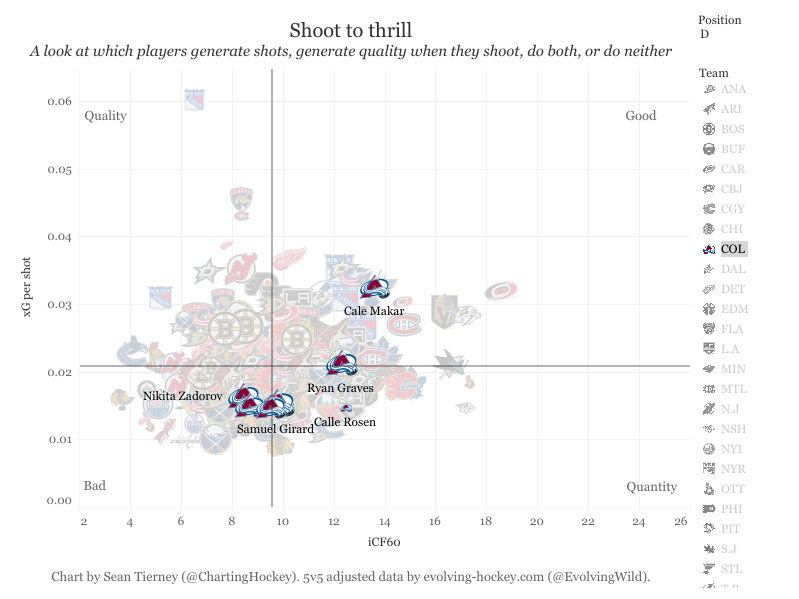
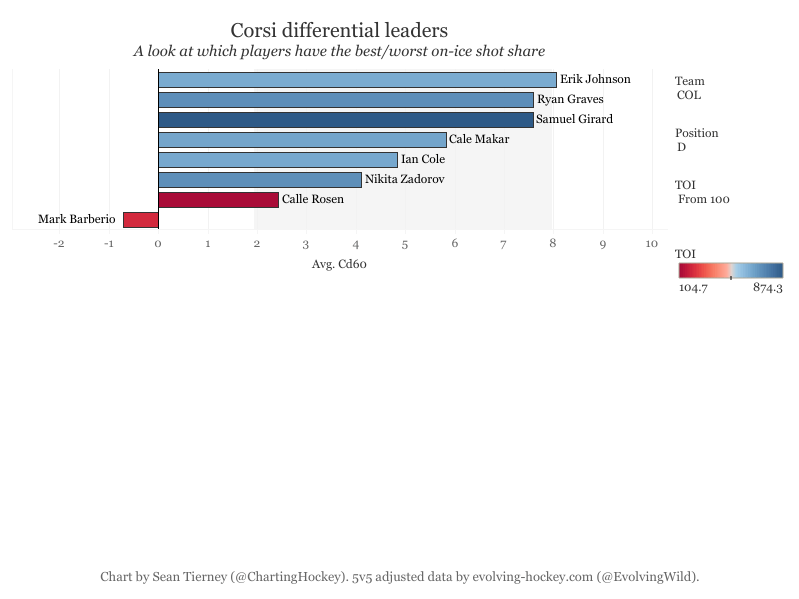
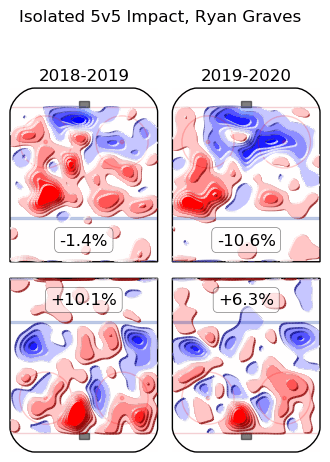
So, what does all of that mean?
It means Graves has been a combination of lucky and good. Sometimes those two things feed into each other and it looks like that’s the case here with Graves.
His shot rates are good as the Avalanche takes more shots than they allow, both in quantity and quality when Graves is on the ice. He doesn’t drive the kind of offense suggested by his point totals but there’s always something to be said for a player who finishes his chances.
That’s the overarching theme with Graves this year. He gets a chance and takes advantage of it. It’s come via some tough love but the development of Graves has been an undeniable win for the franchise.
“They allowed me to grow,” he explained. “There are good games and bad games, good periods and bad periods. Whether it’s been tough love or through video, they allow you to grow. There are times you need to hear it. I’m able to do that. I like it here. I’m happy to be here and I know that’s just the beginning. I know there’s a lot of work to be done to prove that I can play in this league.”
Of course, no conversation about Graves and stats would be complete without bringing up the, ah, controversial plus-minus. Graves leads the NHL at +34, an astronomical number that suggests an outrageous amount of luck.
While the underlying numbers don’t totally support a player riding an insane luck heater, there’s no denying he’s been on the better end of good fortune this season.
“It’s a positive,” Graves said with an unintentional pun. “I try to worry about the minuses more than the pluses. I’m plus whatever I am and I definitely don’t have that many points so I’m clearly not putting the puck into the net every time. I think for me, just going into every game trying to be reliable defensively and keep the minuses to a minimum. If I’m reliable defensively, that’s when I’m the best asset to the team.”
That team is now sitting in second place in the Central Division as they return from their bye week this weekend when they take on the Philadelphia Flyers. Graves has been a major part of that success and whether or not he’s able to keep it up the rest of the year will be a significant factor in Colorado’s attempt to chase down the St. Louis Blues for the division title.
“It’s been fun,” Graves said. “We have a good team here. It’s exciting and it makes it fun to come to the rink every day. I feel lucky to be part of it.”
While Graves is part of it now, the reality is there are decisions to be made this summer. His contract is expiring and top prospects Bowen Byram and Conor Timmins are both going to push hard for NHL jobs. Graves knows the score and is ready to continue fighting for his job.
“You can’t become comfortable,” he tells me. “There’s always guys coming in competing and pushing you from the back. There are guys that I’m pushing, too. It’s good to have competitiveness inside your team. I’ll continue to work at it and make sure that I stay here.”
I ask if that’s the goal.
He flashes his trademark smile once again.
“That’s my goal. To make sure I stay.”
Comments
Share your thoughts
Join the conversation



